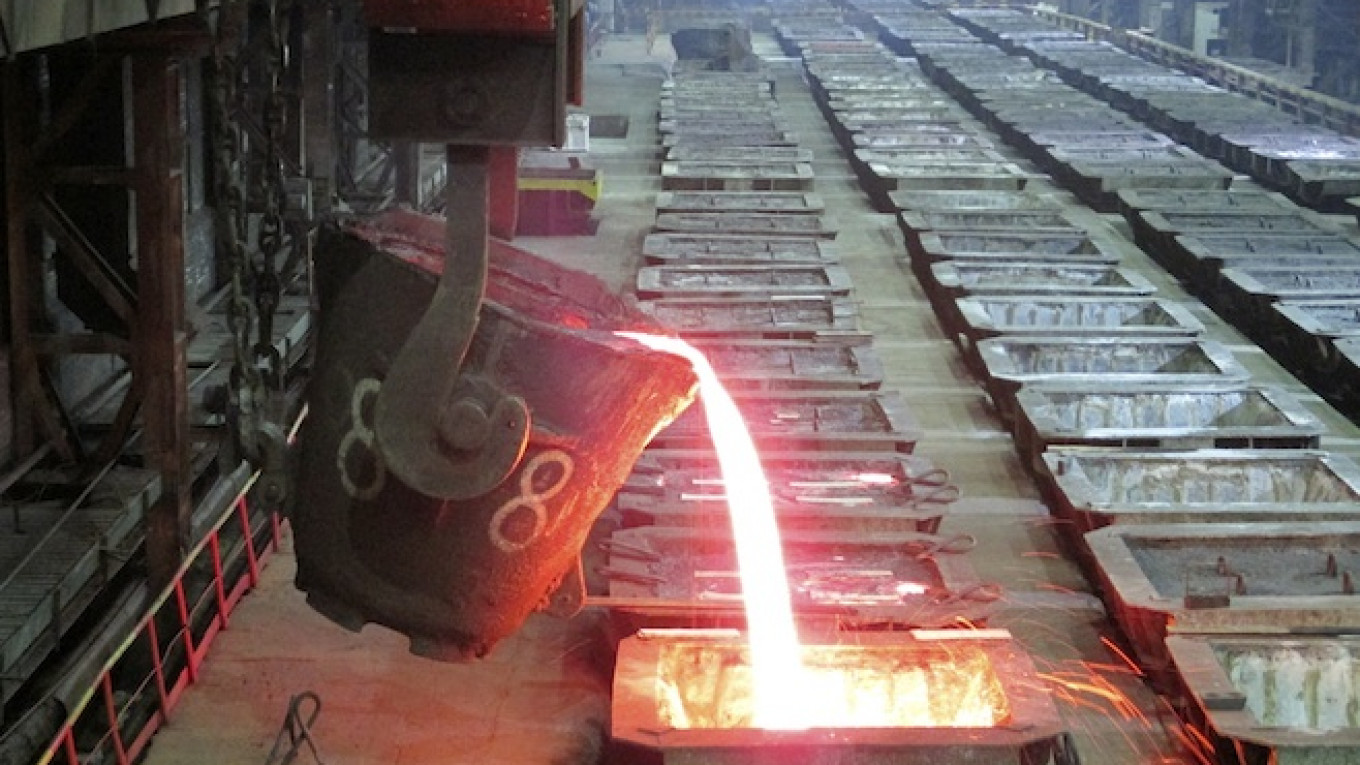NORILSK — Russia's financial crisis is posing a stark challenge to the country's largest mining company. How can Norilsk Nickel protect the living standards of thousands of workers cut off inside the inhospitable Arctic while also satisfying its shareholders?
The slump in the ruble and a resulting rise in inflation could have an outsize effect in Norilsk, a town 300 kilometers inside the Arctic Circle where more than a quarter of the 220,000 population work for the company, and it's hard to shop around.
Winter temperatures in Norilsk plunge to levels that visitors can find distinctly uncomfortable, but for the isolated workers who live there any hint of a rise in the cost of living is equally unwelcome.
With the ruble down 50 percent against the dollar since early last year and Russian food inflation above 15 percent, it falls partly to the company to bear the cost of holding down prices in the grimy industrial city where it is based.
Norilsk Nickel, the world's largest producer of nickel and palladium, owns a loss-making chain of seven shops called "Sunflower," which have sold staples such as milk and bread more cheaply than other stores in the city since 2011.
The company also helps other retailers bring food supplies to the city and subsidizes their transport costs. It increased its workers' salaries on Jan. 1 and plans another review on April 1, said Vladimir Potanin, chief executive and co-owner.
"We are doing our best to compensate for increases [in food prices]," said Potanin, Russia's eight richest man.
But prices have still jumped. Sugar prices rose 17 percent, month-on-month, in the city's shops in December, compared with 14 percent in the rest of Russia, while eggs jumped 23 percent, according to official figures.
Gennady Poltorikhin, the head of a local sled-dog sport federation and a breeder of huskies, said steeper price rises may lie ahead in Norilsk.
"We are consuming products that were brought in during the autumn," he said, and the seven "Sunflower" stores were too few to have much impact on prices in a large town.
Norilsk is one of Russia's few big sources of hard currency outside the oil and gas sector, and as energy prices plummet its value to the overall economy grows.
While world metal prices are falling, this is more than offset by the fall in the ruble, allowing Norilsk to maintain healthy profit margins despite lower foreign currency earnings.
Arctic Circle
But the company's business model includes costs of effectively maintaining a major city north of the Arctic Circle, in probably the most difficult conditions on earth for any settlement of its size.
As Potanin was speaking in the company's offices in Norilsk last week, the temperature outside stood at minus 37 degrees Celsius.
Most Norilchanins get used to such weather, but newcomers find they have to move around the town by car if they want to breathe normally as high humidity and strong winds make the cold hard to bear for more than five minutes.
Life has never been easy or cheap in Norilsk, where prisoners from Stalin's labour camps built the first smelter 80 years ago. Temperatures can drop to minus 55 C.
Under snow for up to nine months of the year and in darkness for more than a month in winter, Norilsk is one of the world's most polluted places, where the metals plants send plumes of sulfurous smoke high into the air.
In Soviet times, employees were paid three times more than other workers in the metals sector elsewhere in Russia, which many in Norilsk still call "the mainland."
The only year-round access to the rest of Russia is by air, while the company also uses a fleet of Arctic ice-class ships to export its products by sea.
"In Soviet times people came to Norilsk for three years to make money. This time frame has begun to stretch," Poltorikhin said.
Now workers are paid 70,000 rubles ($1,000) a month, 2.5 times higher than the Russian average, and those involved in production get extended annual holidays of up to 90 days.
The city also receives 10 percent of the taxes paid by the company, which was enough to cover the city's annual budget of 6 billion rubles ($87 million) in recent years, Potanin said.
Norilsk Nickel paid 6.2 billion rubles in grants covering areas such as health resorts, pensions and housing in 2013, worth $90 million at today's exchange rate.
But even if the company has to increase its social spending, it is clear that at least for this year, income is unlikely to be significantly hit.
Norilsk Nickel is targeting a core profit margin of more than 40 percent in 2015 and its dividends are important for shareholder Rusal, the aluminum giant, which has to service $10 billion in debt.
Those profits are also welcome to the town's inhabitants.
"Life is slightly better than in Russia on average, as people have jobs," said Poltorikhin. "Although living costs are comparable to Moscow."
A Message from The Moscow Times:
Dear readers,
We are facing unprecedented challenges. Russia's Prosecutor General's Office has designated The Moscow Times as an "undesirable" organization, criminalizing our work and putting our staff at risk of prosecution. This follows our earlier unjust labeling as a "foreign agent."
These actions are direct attempts to silence independent journalism in Russia. The authorities claim our work "discredits the decisions of the Russian leadership." We see things differently: we strive to provide accurate, unbiased reporting on Russia.
We, the journalists of The Moscow Times, refuse to be silenced. But to continue our work, we need your help.
Your support, no matter how small, makes a world of difference. If you can, please support us monthly starting from just $2. It's quick to set up, and every contribution makes a significant impact.
By supporting The Moscow Times, you're defending open, independent journalism in the face of repression. Thank you for standing with us.
Remind me later.


